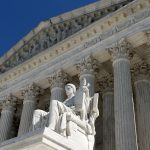By Ryan Michaels
The Birmingham Times
When the surprise news came down Thursday morning that the U.S. Supreme Court had voted 5-4 in favor of Black voters in Alabama, saying the state must draw a new congressional map which is more representative of the state’s population, there was “celebration and applause” in the offices of Greater Birmingham Ministries (GBM), said Scott Douglas, executive director of the group.
GBM, an organization based in the city’s Druid Hills neighborhood which provides emergency services for people in need and pushes for systemic change for all people, was among the numerous plaintiffs in the suit challenging the congressional map.
The Supreme Court’s Thursday decision is a big deal because it is a “reversal of a trend” in limiting the voting rights of people of color, Douglas said.
While many were surprised by the Court’s decision, the case against the state’s maps simply “makes sense,” Douglas said.
“It makes sense that there should be equal representation of people, regardless of race or color and that people should not be discriminated against in ways that silence their voices by packing them in one [district],” he said.
Despite the fact that 25.6 percent of the state’s population is Black, the Alabama Legislature approved a congressional map containing only one majority Black district out of the seven total across the state in 2021. The Supreme Court found that that map was likely in violation of the Voting Rights Act of 1965.
Douglas said he heard the news during a weekly staff meeting and everyone present “celebrated and shouted.”
Douglas said he Supreme Court’s decision is victory for voters across Alabama “Black and white but people of color, in particular, we can say our vote does count, and you can make it count.”
Birmingham Mayor Randall Woodfin, who has spoken out against the proposed map, said, “The SCOTUS decision today is a powerful blow to racial gerrymandering in Alabama. The old map was a clear attempt to dilute the power of Black voters. We will not stand for silencing Black voices.”
U.S. Rep. Terri Sewell, who represents Alabama’s 7th Congressional District, currently the only majority Black district in the state, said the High Court’s decision was a “historic win” for not only African American voters but for “democracy … a historic decision that will affect not just the state of Alabama but will also affect North Carolina, Ohio, and I dare say, a lot of the southern states where the African American population is in excess of 25%, and there’s only one majority minority congressional district,” said Sewell, during a video press conference on Thursday.
Evan Milligan, a leading plaintiff in the case and executive director of statewide nonprofit Alabama Forward, said the Supreme Court “upheld what we knew to be true: that everyone deserves to have their vote matter and their voice heard. Today is a win for democracy and freedom not just in Alabama but across the United States,” Milligan said, in a statement.
The ruling, Milligan said, “proves that politicians cannot weaken community representation by distorting congressional lines … The voters will be heard, and this ruling will help secure our futures,” he added.
President Joe Biden said the decision “confirms the basic principle that voting practices should not discriminate on account of race, but our work is not done … the right to vote and have that vote counted is sacred and fundamental — it is the right from which all of our other rights spring. Key to that right is ensuring that voters pick their elected officials — not the other way around.”











